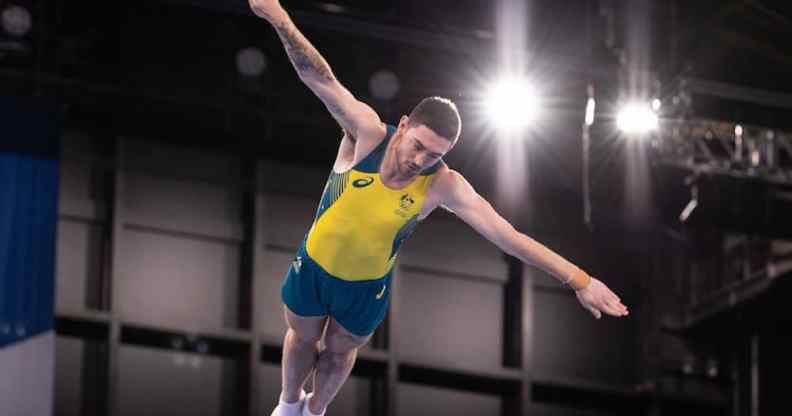Olympic hero shares ‘isolating and embarrassing’ story to inspire queer kids like him

Australia’s Dominic Clarke competes in the men’s qualification of the Trampoline Gymnastics event during Tokyo 2020 Olympic Games. (AFP via Getty/ Yuki IWAMURA)
Gay Olympic trampoline gymnast Dominic Clarke has opened up about his struggle to come out as an athlete: “It was isolating and embarrassing.”
The Australian trampoline gymnast competed in his first Olympics in Tokyo this summer as an openly queer athlete, but his journey to get there has been far from smooth.
Writing for Outsports, Clarke said that in Tokyo, after making it through the qualifying round and becoming one of the top gymnasts in the world, he “felt humbled and accepted by all the boys in that room, a feeling that was such a rarity in my competitive career”.
Although he had a “gay old time” at the Olympics, able to be “campy and quirky with the whole world watching”, it hasn’t always been that way.
He explained: “As a walking stereotype, it was to no one’s surprise that I was a flaming human rainbow when I started coming out to people as a teen… Home, training and even school were always safe places for me, and I was lucky to have that, as I know that many others in my queer family didn’t.”
But, “trying to figure out my queer identity at such a young age while being involved in gymnastics was confusing,” Clarke said.
“When you’re a male gymnast, or involved in one of the aligning sports (like dance or figure skating), the questions begin before high school.”
Before he’d even had time to explore his own identity, he was pelted with questions and comments from those around him, like “you’re a gymnast, you must be gay” or “isn’t that for girls?” or “you have to wear a leotard, that’s so gay.”
But defending himself and his sport, he said, meant “lying to myself by repeatedly saying I wasn’t gay”. By the time Clarke finally came out to others at his gym, he felt like he “was constantly perpetuating the stereotype of gymnastics”.
He mostly hung out with the girls at his gym, but when he reached an elite level and joined a men’s team, he found that “being the only gay guy in a boy’s club environment is tough”.
He continued: “The guys would try to be relatable, but after a while, the butt jokes and the constant referencing of my sexual identity started to take a toll.
“There were only so many times I could put up with teammates or coaches saying homophobic slurs before it started affecting my mental health.
“To cope, I would let the microagressive behavior slide, keep my mouth shut and butch myself up… In 2016 my mental health started to deteriorate.
“It was isolating and embarrassing and for the first time, I wished I was back in the closet.”
Dominic Clarke reached a turning point when he began showing other athletes his ‘true colours’
Three years ago, as Dominic Clarke made his first world championship final and began to prepare for the Olympics, he reached a turning point.
Although he said he was “disappointed” that he felt he “only had the capacity to finally do this once I started succeeding at the highest level”, Clarke finally realised: “I could start using my jumping for something greater than just trying to get perfect 10s.”
Clarke added: “It took a long time for me to finally tell my story and to untrain myself that identifying as a ‘queer gymanst’ wouldn’t take away from who I am as an athlete.
“At the beginning of 2021 and leading up to the Games, I began to contribute publicly to the conversation about equality and inclusivity within all sport.
“As an openly gay gymnast who people saw at the Olympics, I hope I can inspire others to feel pride within themself… At the end of the day, we’re just doing flips and we’re not changing the world in a major way, but that doesn’t mean that we can’t create small changes within it.”

